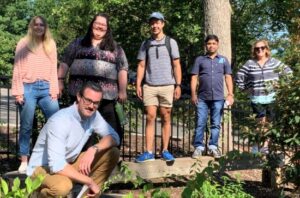CSB Spotlight: Jackson Lab

Lauren Parker Jackson, assistant professor of Biological Sciences, got her start in the lab of Gerald Stubbs right here at Vanderbilt University. You might say, “She’s one of our own!” After a detour across the pond, Dr. Jackson is back at VU combining two of her loves – science and mentoring students – and having fun doing it.
What projects does your lab currently work on? The Jackson lab studies molecular mechanisms of membrane trafficking protein complexes. Membrane trafficking is essentially a cellular “FedEx system.” We aim to understand how multi-subunit protein nanomachines assemble on membranes to drive critical cellular pathways. We also study how their regulation ensures important protein and lipid cargoes are delivered to the right destination at the right time. We focus on several protein “coats” found on endosomal and Golgi membranes, including retromer, COPI and AP coats.
What are the primary tools and techniques you use to answer these questions? We integrate structural methods (cryoEM, X-ray crystallography, NMR) with a variety of biochemical and biophysical techniques like pulldown and liposome pelleting assays, calorimetry and SEC MALS. We aim to test our structural models by breaking specific protein-protein interfaces in either organisms (budding yeast) or in cultured cells.
What was your path to this position? What is your favorite part of being a PI? As an undergraduate, I majored in chemistry with a minor in classical studies. I have always loved reading and writing, which turned out to be surprisingly useful for my current role. I left the U.S. for graduate studies, when I moved to Cambridge (UK) to study protein crystallography at the MRC Laboratory of Molecular Biology. My path was a bit unusual. I had a short detour between my Ph.D. and postdoc when I worked as a management consultant for BCG in London for a couple of years. I learned that I really didn’t like that type of consulting, but I loved science and independence. I always encourage trainees to reach out and discuss the positives in academia with me, because it’s not all doom and gloom.
I have two favorite parts about my PI role. Nerd alert: the first part is looking at electron density and building structural models. I still love that after all these years, and the strong CSB community played a huge role in my coming to Vanderbilt. The second part is working with my group and mentoring/teaching. COVID disruptions really highlighted how much I missed personal interactions with students and trainees over the past year, and I am so glad to see people in real life again.
What are some fun lab activities you like to do? Garden parties, trivia and trying snacks and food from all over the world.
What do you think is the key to running a successful group? Open communication and trust. The PI and trainees need to discuss everything from expectations (short- and long-term) to career development to the nitty gritty of project details. It’s important to find ways to communicate clearly and often with your group, and to be willing to adapt when necessary. We also need to build trust. Students need to come to me when things aren’t working, or when they are uncertain about their project or path. They need to know I am here to help and advise without judgment. I also need to trust them to carry out their daily work and to make good decisions as their training progresses. And when things are challenging, we need to communicate and trust each other so we can find a path forward, rather than re-hashing the same mistakes. I often feel that distrust has crept into conversations about mentor/mentee relationships because people assume it must somehow be adversarial. None of us are perfect, and we all make mistakes, but we need to remember we are on the same team and treat each other as colleagues.
Leave a Response
You must be logged in to post a comment